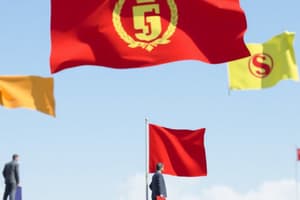Podcast
Questions and Answers
What is a defining characteristic of communism?
What is a defining characteristic of communism?
- Citizens own their own businesses and land.
- The government owns all businesses and farmland. (correct)
- Economic freedom through a free-market system.
- Providing limited services to citizens.
Which economic system is characterized by high taxes and government provision of basic necessities?
Which economic system is characterized by high taxes and government provision of basic necessities?
- Fascism
- Capitalism
- Socialism (correct)
- Anarchism
Which statement best describes capitalism?
Which statement best describes capitalism?
- Citizens have minimal economic freedom.
- The government provides all healthcare and education.
- It operates on the principles of supply and demand. (correct)
- The government owns all resources and production.
What typically determines a country's position on the political spectrum?
What typically determines a country's position on the political spectrum?
Which country is an example of a socialist economic system?
Which country is an example of a socialist economic system?
Which of the following is a common outcome of capitalism?
Which of the following is a common outcome of capitalism?
What is a primary criticism of communism as it has been implemented historically?
What is a primary criticism of communism as it has been implemented historically?
What is a key factor that typically leads wealthier democratic countries to lean left on the political spectrum?
What is a key factor that typically leads wealthier democratic countries to lean left on the political spectrum?
Flashcards
Communism
Communism
A political and economic system where the government owns all businesses and land, providing for everyone's needs (healthcare, education, welfare).
Capitalism
Capitalism
An economic system based on a free market (supply and demand), low government regulation, and individual responsibility for services like healthcare and education.
Socialism
Socialism
A system where the government provides basic needs like healthcare, education, and essential services, often with high taxes. Citizens own businesses and land.
Economic Systems
Economic Systems
Signup and view all the flashcards
Political Spectrum
Political Spectrum
Signup and view all the flashcards
Factors affecting political position
Factors affecting political position
Signup and view all the flashcards
Left-wing
Left-wing
Signup and view all the flashcards
Right-wing
Right-wing
Signup and view all the flashcards
Study Notes
Economic Systems
- Economic systems deal with how a country controls and distributes wealth.
- Different systems have different approaches.
Communism
- Examples: Former USSR, Cuba
- Government owns all businesses and farmland.
- Everyone works for the government.
- Government provides healthcare, education, and welfare, prioritizing the needs of the country over individual needs.
- Equality is the central aim.
- Historically, communism has not functioned as intended.
Capitalism
- Example: USA
- Economic freedom through a free market (supply and demand).
- Government regulation is limited, resulting in lower taxes.
- Individuals must pay for services like healthcare and education.
- Often creates a large gap between rich and poor, due to limited social assistance programs (welfare, minimum wage).
- Historically, capitalism has not functioned as intended, needing regulations.
Socialism
- Example: Norway
- Government provides necessities (healthcare, education, welfare and essential services, like police and postal).
- This is financed through high taxes.
- Government owns some larger industries, while citizens own their own land and businesses.
- Government controls aspects of the economy and environment through strict regulations.
Political Spectrum
- A representation of political ideologies along a spectrum.
- The left wing generally favors more government intervention and equality, while the right wing favors less government intervention and individual liberty.
- Factors determining a country’s position on the spectrum:
- Wealth creation and distribution among the population.
- Societal willingness to adopt change.
- The degree to which the government prioritizes the rights and needs of its citizens.
- Wealthy democratic countries usually fall on the left side of the spectrum. These countries tend to value their citizens and readily accept new ideas and different perspectives.
Studying That Suits You
Use AI to generate personalized quizzes and flashcards to suit your learning preferences.




